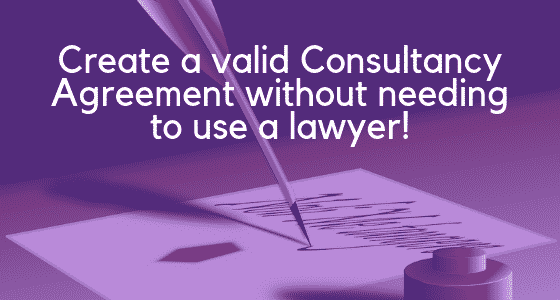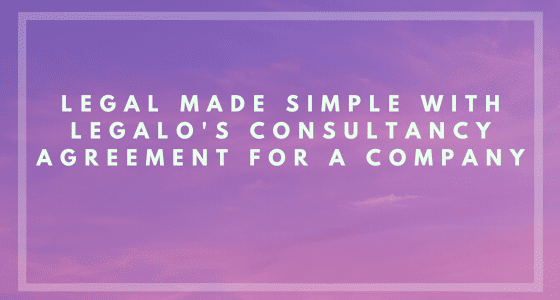Consultancy Agreement – For A Company
Our Consultancy Agreement for a Company template
- easy to use, yet robust, consultancy agreement
- free guidance notes in plain English
- use it where the consultant is a limited company
- includes various options to help you complete the draft

How Does It Work?
-
1. Download
-
2. Edit
-
3. Print
-
4. Sign
MD, Legalo Ltd; Solicitor; Notary Public
This is our standard consultancy agreement template, for use when you are taking a consultant that is a company. This includes an individual who is trading via a limited company, e.g. personal services company.
It is relevant where the consultant is a proper independent contractor and the tax and employment status of the individual or individuals provided by the consultant is/are truly not that of employees of the company using the consultant.
If you are taking on an individual as the consultant, then you need our consultancy agreement for an individual – click on the link.
Using our Consultancy Agreement for a Company Template
You can adapt this consultancy agreement template to suit your individual requirements. It has various options you can choose between, so it will suit you:
1. whatever type of services are being provided by the consultant;
2. whether the consultant can or cannot send a replacement for the personnel it will provide to do the work; and
3. whatever the term of the consultancy agreement is – short, long or indefinite.
David, our co-founder and solicitor for over twenty-five years, drafted this template. David’s experience and expertise ensures that you buy an agreement template that is reliable, well-drafted and in plain English.
We also provide (included with the download) a full set of free guidance notes. These notes offer a clause-by-clause explanation of the consultancy agreement. They also help you to complete your final document just as you want it. A summary of the guidance notes are available here: guide to this template.
Using our Consultancy Agreement for a Company Template
This template is available for download in Word format. After purchase, you can then edit it to suit your individual requirements.
A “no quibbles” money-back guarantee is provided, in the event that you are not satisfied with your purchase.
Once you buy it, you can use the consultancy agreement as many times as you want. You will also get free updates to this draft, as and when the document is updated. This ensures ongoing peace of mind at no further cost – incredible value for money.
Other Commercial Templates Available
If you would like to see the full range of our employment templates or our commercial contract templates, where we have other consultancy agreement available, click the links.
Also if you want to know more about HMRC’s IR35 rule, have a look at Wikipedia.
FAQs on a Consultancy Contract for a Company
Below, we have answered the most popular questions from the Internet on this type of template.
What is a business consultant agreement?
A business consultant agreement is a legally binding contract between a consultant (or consulting firm) and the client business. It establishes the terms and conditions for the consultant’s professional services. This agreement covers essential aspects like the scope of work, pay, duration, confidentiality, and dispute resolution. Also, by setting clear expectations and responsibilities, the agreement facilitates a productive and mutually-beneficial relationship between the consultant and the business. It supports the status of the consultant as a self-employed business if you:
- draft the consultancy agreement correctly; and
- also follow the principles for self-employment when you operate the consultancy service in practice.
Do consultants need a contract? Do you need a consulting agreement?
To help avoid tax problems with the self-employed status, a formal contract is required in practice. HMRC is often attacking self-employment situations, because they want the higher rates of national insurance that employment situations pay them. So having a good contract in place helps defend against this threat from HMRC. This is because the contract can be used to support your case that the self-employment status is genuine.
A good written contract can also help avoid a situation where the client decides later on to treat the consultant for tax purposes as an employee and start deducting tax and NICs from their pay under the latest IR35 rules. See the guidance we offer on this page.
Can you terminate a consultancy contract?
Yes, a consultancy contract can be terminated. Contracts should set out the terms for termination, such as:
- the notice period required; and
- whether termination can be without a notice period in the case of a serious breach.
However, the statutory minimum notice period, that applies to an employee, will not apply to a self-employed consultant.
Is a consultancy agreement an employment contract?
A genuine consultancy agreement differs from an employment contract because it establishes a self-employed relationship between the consultant and the business. This arrangement is also known as being an independent contractor, rather than an employee. So this means the consultant has greater flexibility in how and when they work, and how they deliver the service they are being paid for. As a minimum, the consultant assumes responsibility for:
- paying their own taxes; and
- determining their own benefits, but this would come out of the money paid them by the client.
In contrast, an employment contract establishes a traditional employer-employee relationship with defined legal obligations, employment protections. As such, the differences are vast and are all of the many differences between self-employment and employed status, such as:
- PAYE tax deduction for employees and paying higher rates of NICs;
- minimum notice periods;
- protection from unfair dismissal;
- the right to raise a grievance;
- the right to go on strike;
- minimum wages;
- holiday leave and pay;
- redundancy pay;
- sick pay;
- regular working hours, rest breaks and limits on working hours;
- maternity leave and pay, parental leave; and
- other employment rights.
In contrast to that long list, the only rights that employees enjoy that self-employed contracts also share are:
- safe working conditions; and
- protection against unlawful discrimination.
What is the difference between a consultancy agreement and services agreement?
A “services agreement” is just a generic name for a contract where the customer pays a supplier for certain work to be done. It would not specify by whom the work would be done. It is often an on-going contract. A consultancy agreement, as a form of self-employment, is a “contract for services”, but not an employment contract (i.e. a “contract of service”). A consultancy agreement is often one where a specific consultant is supplied by the consulting business to the client. This is often the key difference. It is more commonly a project-specific contract, so it ends when the project has been completed, rather than being on-going.
How do you structure a consulting contract? What should be included in a consultant agreement?
You typically structure a consulting agreement like this:
- Introduction: Begin by identifying the parties involved, the date, and the purpose of the contract.
- Scope of Work: Clearly define the services to be provided, including deliverables and a timeline. Often the parties set out this detail in a schedule.
- Compensation: Specify the payment terms, rates, and any reimbursable expenses.
- Tax: Confirm that the consultant is self-employed and, as such, will be paid gross, but is responsible for paying its own tax.
- Confidentiality: Include provisions to safeguard sensitive information.
- Termination and dispute resolution: Outline the conditions under which either party can terminate the contract and the notice periods.
- Intellectual Property: Cover the ownership of any work products or intellectual property.
- Dispute Resolution: Set out a process to resolve disputes.
- Indemnification and liability limitations.
- Governing Law: Specify the jurisdiction and the laws that will govern the agreement.
- Miscellaneous Clauses: Include clauses for insurance that the consultant must hold, and any other relevant terms.
- Signatures of both parties.
It is important to set out these terms clearly, so as to protect both parties. It is also important to ensure the contract does not contravene the factors that HMRC say point towards a genuine self-employment situation.
Using a great template, like the one Legalo offers, is best, so that you can create a comprehensive and legally valid agreement. It’s easy to structure your own agreement with our great template, because it includes all of the essentials of the contract.
What are the benefits of a consulting agreement?
The advantages of a consultancy agreement include:
- Clarity: Clearly defines work scope, expectations, and responsibilities.
- Legal Protection: Safeguards the rights and interests of both parties.
- Dispute Resolution: Establishes a framework for conflict resolution.
- Confidentiality: Ensures the protection of sensitive information.
- Payment Terms: Outlines compensation and payment schedules.
- Risk Mitigation: Minimises potential liabilities and misunderstandings.
- Professionalism: Demonstrates a commitment to a formal and structured business relationship.
Also good consultancy agreements ensure professional and legally-secure engagements between consultants and clients.
Why is a consultancy agreement important?
A consultancy agreement is essential, because it:
- Defines Expectations: Clearly outlines work scope, responsibilities, and deliverables to prevent misunderstandings.
- Legal Protection: Establishes a binding contract that safeguards the rights and interests of both parties.
- Confidentiality: Ensures the protection of sensitive information.
- Dispute Resolution: Provides a framework for resolving conflicts.
- Professionalism: Demonstrates a commitment to a formal and structured business relationship where the consultant determines the detail of how they deliver the project, with the client being more interested in the end result, rather than the process.
- Risk Mitigation: Helps minimise liabilities and risks.
Why would a company employ a consultant?
Companies engage consultants under a consultancy agreement for a variety of reasons, including:
- Specialised Expertise: Consultants bring specific skills and knowledge.
- Objectivity: External perspectives offer unbiased insights.
- Temporary Needs: Clients generally hire consultants for short-term projects.
- Cost-Efficiency: Avoiding long-term employment costs.
- Efficiency: Faster problem-solving and project execution.
- Flexibility: Easily adapt to changing business demands.
- Access to Networks: Consultants may have valuable industry connections.
So you can see that consultants provide strategic solutions, assisting companies in overcoming challenges and achieving their goals effectively and efficiently.





